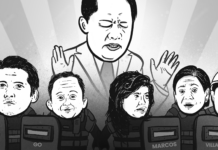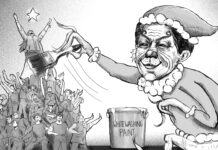THE PRESIDENCY is no easy job, but there sure was no shortage of aspirants wanting to take it just the same.
After the five-day period set by the Commission on Election (Comelec), a total of 130 people filed their certificates of candidacy (COC) for president, the highest number in Philippine election history, easily beating 2010’s 99 candidates.
They included a man who described himself as an “intergalactic space ambassador,” another who goes by the name “Archangel Lucifer,” and a few others who said they were running because they had been told by the heavens to do so.
Their presence provided comic relief in what was supposed to be a serious undertaking at the Comelec main office in Intramuros, Manila. (Don’t forget that we’re going to choose our next leaders soon and the last thing we need is a bunch of jokers making a mockery of our elections.)
It is easy to see that the perennial presence of so-called nuisance candidates in the national elections may be a microcosm of how Filipinos could be so puffed-up about their self-worth that they could entertain delusions that they would be qualified for top leadership.
The Omnibus Election Code defines “nuisance” candidates as those who make a mockery out of the election system, seek to confuse voters through similarity of names between candidates, and those who have no good faith in running for office.
It is interesting how many people want to be the president of a country that is still far from being developed. Obviously, many of them are not aware of the huge responsibilities that they may inherit from the previous administration.
Most of these presidential hopefuls do not even have the slightest idea about how big of duty they will have to take if they will win in the election.
It does not suffice that one knows how to read and write, nor does having a noble and genuine advocacy, in order to make a good leader. One must at least have the knowledge and experience about our political system and the problems that our country is currently facing. Leaders are not born, they are made—through proper education and experience.
Of course, the Comelec is expected to trim down the list and eliminate nuisance candidates. By the time the commission is done, we’ll probably be left with four to six “serious” presidential candidates.
The joke—or to some extent, freak show—that was the filing of COCs actually mirrored a larger travesty that is, the way we generally elect our leaders. We talk about maturing as a democracy yet we keep shooting ourselves in the foot by electing jokers in office. Indeed, we deserve the leaders we choose.
How many of us, for instance, really bothered to scrutinize the track record (or the lack of it) of the so-called “serious” candidates for president (never mind those “sent by aliens”)? What’s their stand on specific issues and if they’ve been consistent with it? How do they intend to handle, for instance, issues of poverty, job generation, law enforcement, diplomacy, and the economy? What have they actually done to deserve our vote?
To be sure, the official Comelec list of presidential candidates will include the likes of Mar Roxas, Grace Poe, Miriam Defensor-Santiago, and Jejomar Binay.
And set against such “clowns” and other nuisance candidates, they would perhaps represent sanity and fitness for office.
But think again. Are they really fit for the presidency?
Our Constitution expressly provides for democracy, giving all citizens the right to run for a government position, it sets a minimal set of qualifications for a presidential candidate—he or she should be a natural-born Filipino, a registered voter, able to read and write, at least 40 years old, and a resident of the Philippines for at least 10 years.
But still Poe has decided run for the highest office of the land amid questions whether she’s natural born and, since she was an American citizen who reacquired Philippine citizenship, whether she has fulfilled the residency rule.
Beyond the elementary requirements of election to public office, Poe does not really satisfy the more demanding requirements for the presidency—experience and track record. In fact, she emerged topnotcher on the 2010 senatorial elections on the strength of the name of her father, movie action king Fernando Poe Jr.
Of course, other contenders have been longer in office, and may qualify better for president, such as Vice President Binay, whose person and family have ruled Makati, the Philippine Wall Street, for nearly 30 years now, whose progress only has everything to do with private business and development; and who’s now facing a spate of plunder cases, all of whose investigations he continues to evade or apply the predictable dilatory tactics. And, Roxas, who had a bland performance as transportation secretary and, even more disappointingly, as local governments secretary and head of civil defense during “Yolanda.”
As for Santiago, her grotesque claim of having been cured from Stage 4 cancer by a miracle dovetails with her other antics before, such as lobbying for a seat in the International Court of Justice and after getting it, claiming to be suffering from a host of ailments so that the Philippines was unable to take its seat in the world court.
A fruitful election will only be assured if, we, as voters, will exercise responsible voting—because it will be our only hope, if there is still any left, to finally have a leader that will lead this country toward the positive change that it needs.
It is time to do our homework and check what these presidential wannabes have actually accomplished in the course of their careers in government, and how this could make them a good president. Or perhaps, we should consider lesser-known candidates who might actually be more qualified but are unfortunately not gifted with popularity.
Candidates will have their own campaign narratives, well-funded political advertising intended to “sell” them to voters mainly through media. There’s not always truth in advertising.
It’s our job to see through these untruths and try to unmask these candidates for who they really are. Let’s not vote just because she is her father’s daughter or he seems pro-poor. Or that she’s a great orator or that he’s been endorsed by a popular politician.
Let’s talk about competence, experience, track record, a genuine desire to serve, and a strong personal value system.
We’re probably asking too much of our leaders. But that’s because we don’t want the joke to be on us in the end.
















